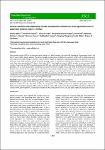Genetic variation and relationships of total seed protein content with some agronomic traits in pigeonpea (Cajanus cajan (L.) Millsp.)
Date
2018Author
Obala, Jimmy
Saxena, Rachit K.
Singh, Vikas K.
Vechalapu, Suryanarayana
Das, Roma
Rathore, Abhishek
Sameer-Kumar, Chanda V
Saxena, Kulbhushan
Tongoona, Pangirayi
Sibiya, Julia
Varshney, Rajeev K.
Metadata
Show full item recordAbstract
Seed protein content (SPC) is an important grain quality trait, which impacts the nutritional importance of pigeonpea seed in the
diet of over a billion people globally. The present study was carried out to determine variation in SPC and its relationships with
some agronomic traits among 23 parental lines of different types of pigeonpea mapping populations. The parental lines were
evaluated under field conditions during 2014-2015 growing season. A randomised complete block design in two replications was
used. Data were recorded on SPC, days to first flower (DTF), plant height at maturity (PltH), number of pods per plant (NPP),
number of seeds per pod (NSP), hundred-seed weight (SW) and seed yield per plant (SY). There were significant differences among
genotypes for all traits. Broad-sense heritability was 0.693 for SPC but ranged from 0.519 (NPP) to 0.999 (DTF) while genetic
advance was 2.4% for SPC but ranged from 1.2 % (NSP) to 141.2 % (SY), and genetic gain ranged from 11.0 % (SPC) to 230.0 % (SY).
Simple correlation showed that SPC is only significantly but negatively correlated with SW (r = -0.30, P < 0.05), while path analyses revealed that SPC is negatively associated SW and NPP but positively with DTF, PltH, NSP and SY. It is concluded that genetic variation for SPC and agronomic traits exist among pigeonpea genotypes studied. The variation is accompanied by both favourable and unfavourable relationships of SPC with the agronomic traits.
Collections
- Research Articles [23]

